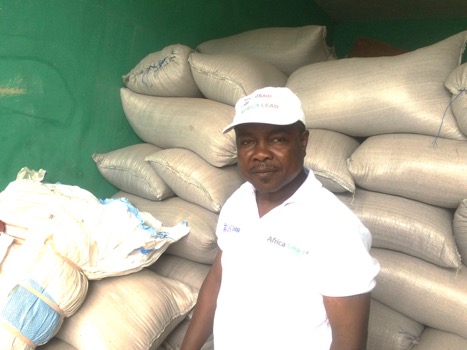
The Human Rights Court in Accra today will continue hearing a case brought by civil society groups seeking to frustrate processes to commercialize genetically modified (GMO) foods in Ghana.
Scientists, farmers, politicians and an official with the nation s biosafety regulatory agency characterized the case as meritless, and an unjust attempt by anti-GMO activists to truncate the whole process of introducing improved crops in Ghana.
According to court documents dated Nov. 23, Food Sovereignty Ghana and three other groups are seeking declarations on whether required processes and laws have been adhered to in the ongoing plans to commercialize GMOs. The case is against the National Biosafety Authority (the government biosafety regulator) and four others, including the Ghana National Farmers and Fishermen Association.
According to court documents, the plaintiffs are seeking a declaration from the Human Rights Court on: Whether or not the defendants have observed the critical domestic and international laws of risk assessment and management in relation to the release and commercialization of Bt cowpea and rice in the country.
Food Sovereignty Ghana has filed the case along with the Vegetarian Association of Ghana, Goaso Kayan Akuafo Kuo (a farmers association) and Convention People s Party (Ghana s third political party). The plaintiffs are also seeking a declaration from the court as to whether the defendants have proper and detailed documentations in relation to the area of risk assessment and management in relation to the intention to release and commercialize Bt cowpea and rice in the Ghanaian ecosystem, and if they meet the accepted legal requirements in the handling of GMO activities.
In February 2015, the plaintiffs filed a suit at the Human Rights Court seeking a declaration that in approving the release and commercialization of GMOs, government had not met the requirement of the law on major issues of risk assessment and risk management. They went on to apply for an interlocutory injunction to restrain government from approving, releasing, and commercializing GMO rice and cowpea. The request for injunction was dismissed by the court.
Edwin Kweku Andoh Baffuor, director of communications of Food Sovereignty Ghana, said they will prove to the court that GMOs will not help Ghana s socio-economic development. This is the beginning of the substantive case to show that Ghana does not need GMOs and the proposals that have been made do not equate to Ghana needing GMOs It s something that we should not entertain, he insisted.
The Ghana National Farmers and Fishermen Association said it looks forward to meeting the plaintiffs in court to argue out the issues. They are just making a lot of noise because they don t have any facts, said John Awuku Dziwornu, an executive of the association. They are not farmers. They are also not in the business of farming. They are just a civil society organization that is linked to anti-science groups that are fighting science and evidence based issues relating to agriculture. Ghana is abiding by all the international protocols. They should go and read and they will understand.
Dziwornu is, however, worried that the repeated efforts to frustrate the process of GMO commercialization in Ghana is stalling the country s development. GM technology can help grow drought resistant crops, provide more nutritious food and stop the destruction of food by pests, he said. This technology is crucial to the achievement of food security. The groups trying to stop it are stalling the socio-economic development of Ghana. They must stop this.
The suit also has drawn reactions from Ghana s legislature. Yaw Frimpong Addo, a member of the Food, Agriculture and Cocoa Affairs Committee in Parliament, believes there is no basis for the court case. I am even surprised they have taken that line of action, he said. Because it is just like somebody wanting to bring scientific innovation into the country and you decided to remain in your old way of doing this. Those who want it (biotechnology) should be allowed to have it. This is a democratic country. If you say you don t want it and you want to truncate the whole process, it s unfortunate.
The MP is convinced Ghana needs genetically modified foods. The fertility in all our lands is gone. Pests are destroying crops. If scientists have developed a variety with which farmers can get 10 bags of maize from one acre, and you want them to still be growing the one where they can get only four bags, then you are not being fair to those people, he added. We need innovations in agriculture. If I want a new variety and you tell me I should not plant it, will you feed my children for me if I need money?
Scientists in the country also say they are confident the GMO trials will see a successful end, despite the hurdles. For the scientific community, we are not perturbed because all new sciences have faced challenges in the past, including computers and immunization, Daniel Osei Ofosu, research scientist and country coordinator of the Program for Biosafety Systems (PBS), said in an interview. But posterity has judged us that these new technologies are actually for the benefit of all mankind and so we are not perturbed. So, we will triumph over the anti-GM movement.
Ghana s state research agency, the Council for Scientific and Industrial Research (CSIR), is currently undertaking trials that will allow for the commercialization of genetically modified cowpea (Bt cowpea) and NEWEST rice. The novel cowpea variety produced using GMO technology has been engineered with genes from a naturally occurring soil bacteria known as Bacillus thuringiesis (Bt), which makes it largely resistant to the destructive maruca pod-borer pest. CSIR is also undertaking trials for NEWEST rice, which is nitrogen and water efficient, as well as salt tolerant.
